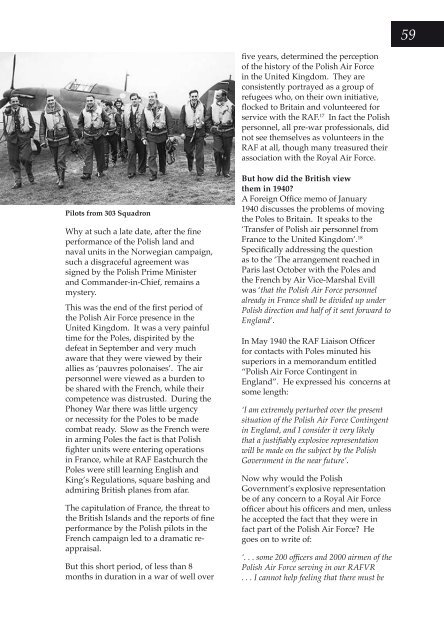REVIEW - Royal Air Force Centre for Air Power Studies
REVIEW - Royal Air Force Centre for Air Power Studies
REVIEW - Royal Air Force Centre for Air Power Studies
Create successful ePaper yourself
Turn your PDF publications into a flip-book with our unique Google optimized e-Paper software.
Pilots from 303 Squadron<br />
Why at such a late date, after the fine<br />
per<strong>for</strong>mance of the Polish land and<br />
naval units in the Norwegian campaign,<br />
such a disgraceful agreement was<br />
signed by the Polish Prime Minister<br />
and Commander-in-Chief, remains a<br />
mystery.<br />
This was the end of the first period of<br />
the Polish <strong>Air</strong> <strong>Force</strong> presence in the<br />
United Kingdom. It was a very painful<br />
time <strong>for</strong> the Poles, dispirited by the<br />
defeat in September and very much<br />
aware that they were viewed by their<br />
allies as ‘pauvres polonaises’. The air<br />
personnel were viewed as a burden to<br />
be shared with the French, while their<br />
competence was distrusted. During the<br />
Phoney War there was little urgency<br />
or necessity <strong>for</strong> the Poles to be made<br />
combat ready. Slow as the French were<br />
in arming Poles the fact is that Polish<br />
fighter units were entering operations<br />
in France, while at RAF Eastchurch the<br />
Poles were still learning English and<br />
King’s Regulations, square bashing and<br />
admiring British planes from afar.<br />
The capitulation of France, the threat to<br />
the British Islands and the reports of fine<br />
per<strong>for</strong>mance by the Polish pilots in the<br />
French campaign led to a dramatic reappraisal.<br />
But this short period, of less than 8<br />
months in duration in a war of well over<br />
five years, determined the perception<br />
of the history of the Polish <strong>Air</strong> <strong>Force</strong><br />
in the United Kingdom. They are<br />
consistently portrayed as a group of<br />
refugees who, on their own initiative,<br />
flocked to Britain and volunteered <strong>for</strong><br />
service with the RAF. 17 In fact the Polish<br />
personnel, all pre-war professionals, did<br />
not see themselves as volunteers in the<br />
RAF at all, though many treasured their<br />
association with the <strong>Royal</strong> <strong>Air</strong> <strong>Force</strong>.<br />
But how did the British view<br />
them in 1940?<br />
A Foreign Office memo of January<br />
1940 discusses the problems of moving<br />
the Poles to Britain. It speaks to the<br />
‘Transfer of Polish air personnel from<br />
France to the United Kingdom’. 18<br />
Specifically addressing the question<br />
as to the ‘The arrangement reached in<br />
Paris last October with the Poles and<br />
the French by <strong>Air</strong> Vice-Marshal Evill<br />
was ‘that the Polish <strong>Air</strong> <strong>Force</strong> personnel<br />
already in France shall be divided up under<br />
Polish direction and half of it sent <strong>for</strong>ward to<br />
England’.<br />
In May 1940 the RAF Liaison Officer<br />
<strong>for</strong> contacts with Poles minuted his<br />
superiors in a memorandum entitled<br />
“Polish <strong>Air</strong> <strong>Force</strong> Contingent in<br />
England”. He expressed his concerns at<br />
some length:<br />
‘I am extremely perturbed over the present<br />
situation of the Polish <strong>Air</strong> <strong>Force</strong> Contingent<br />
in England, and I consider it very likely<br />
that a justifiably explosive representation<br />
will be made on the subject by the Polish<br />
Government in the near future’.<br />
Now why would the Polish<br />
Government’s explosive representation<br />
be of any concern to a <strong>Royal</strong> <strong>Air</strong> <strong>Force</strong><br />
officer about his officers and men, unless<br />
he accepted the fact that they were in<br />
fact part of the Polish <strong>Air</strong> <strong>Force</strong>? He<br />
goes on to write of:<br />
‘. . . some 200 officers and 2000 airmen of the<br />
Polish <strong>Air</strong> <strong>Force</strong> serving in our RAFVR<br />
. . . I cannot help feeling that there must be<br />
59

















